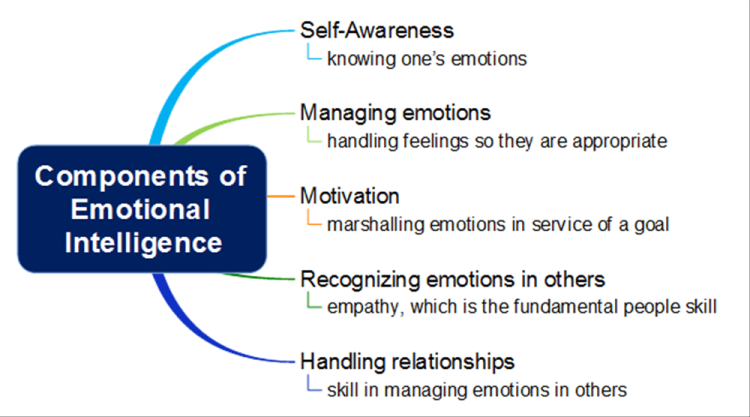Components of Emotional Intelligence

“We are dangerous when we are not conscious of our responsibility for
how we behave, think, and feel.” -— Marshall B. Rosenberg
Emotional intelligence or emotional quotient (EQ) is the ability to
understand, use and control your emotions in a positive way, EQ will help you
to build stronger relationships, succeed at work and at school, communicate
effectively, connect with your feelings, etc.
Daniel Goleman in association with the Hay Group identified eighteen
components of emotional intelligence that were grouped into four clusters. The
four clusters are namely Self-Awareness, Self-Management, Social Awareness, and
Relationship Management.
Self-Awareness: is knowing what one feels and how it reflects on
performance. The cluster contains three competencies: Emotional awareness,
Accurate Self-assessment and Self-Confidence.
Self-Management: refers to managing one's’ internal states, impulses,
and resources. The Self-Management cluster contains six competencies: Emotional
Self-Control, Transparency, Adaptability, Achievement, Initiative and
Conscientious.
Social awareness: refers to how people handle relationships and
awareness of others’ feelings, needs, and concerns. The Social Awareness
cluster contains three competencies: Empathy, Organizational Awareness and
Service Orientation.
Relationship Management: concerns the skill or adeptness at inducing
desirable responses in others. It includes social skills. The Relationship
Management cluster contains six competencies: Developing others, Inspirational
Leadership, Change Catalyst, Influence, Conflict Management and Teamwork.
Why is Emotional Intelligence so Important?
It’s not the smartest people who are the most successful or the most
fulfilled in life there are people who are academically brilliant and yet are
socially inept and unsuccessful at work or in their personal relationships.
Intelligence quotient (IQ) is not enough on its own to achieve success in life.
It's true that your IQ can help you get into college, but actually it’s your EQ
that will help you manage the stress and emotions when facing your final exams.
IQ and EQ exist in tandem and are most effective when they build off one
another.
“Comparing the three domains, I found that “It is very important to
understand that emotional intelligence is not the opposite of intelligence, it
is not the triumph of heart over head — it is the unique intersection of both.”
— David Caruso
Conclusion
Emotional Intelligence leads to success on a personal level as well as
success in the workplace. No one wants to be around a person who cannot quite
grasp the extent of his strengths and weaknesses. As much as people admire a
skillful person, they detest such a person if he or she cannot pass on the
skills to others or better still, a person who is patient with people who are
not as equally gifted. Once a person understands him/herself, he/she can know
the limits of what he/she can do. More to this, he can respect others for what
they can do.
“There are certain emotions that will kill your drive, frustration and
confusion. You can change these to a
positive force. Frustration means you
are on the verge of a breakthrough.
Confusion can mean you are about to learn something. Expect the breakthrough and expect to
learn.”
— Kathleen Pike, Master
Certified Coach
By Antonella Cantillo, Step 9
